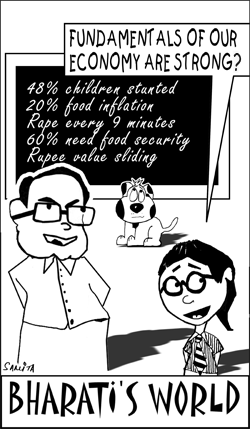Since it was voted to power in West Bengal (pop.91 million) with a landslide majority in May 2011 which ended 34 years of uninterrupted rule of the Communist Party of India-Marxist (CPM)-led Left Front govern-ment in the state, a top priority of the Trinamool Congress (TMC) government, especially its fiery chief minister Mamata Banerjee, has been to transform Kolkata’s showpiece Presidency University (PU) — established in 1817 by a group of 20 eminent scholars led by the legendary social reformer Raja Ram Mohan Roy (1772-1833) — into a centre of academic excellence. But this initiative has suffered a setback.
On July 15 the West Bengal Council of Higher Education (WBCHE) wrote to PU vice chancellor Malabika Sarkar informing her that the council has constituted a four-member facts-finding committee to investigate allegations of irregular faculty recruitment. Earlier in June a Presidency Mentor Group (PMG), chaired by Dr. Sugata Bose, professor of oceanic history and affairs at Harvard University, interviewed and recruited 30 faculty for PU.
The first college in india to admit women students (1897), PU acquired a formidable reputation during its first 150 years and was widely acknowledged as a world-class liberal arts and science college. However after the red star rose over West Bengal in the 1970s and the CPM leadership infiltrated its half-baked intellectuals into the faculties of all higher education institutions including Presidency, it careered downhill swiftly and transfor-med into a run-of-the-mill higher ed institution, even though at the fag end of its 34 years (mis) rule in West Bengal, the Left Front government conferred university status upon it. Therefore one of the first items on the agenda of chief minister Banerjee’s poriborton (change) programme was to restore the lost glory of Presidency University.
 But two years down the road to reform, the TMC government has also succumbed to the temptation of inter-fering with the autonomy of PU. After vice chancellor Sarkar placed the WBCHE letter before the Presidency University council on July 15, its members strongly criticised the WBCHE for unilaterally constituting the facts-finding committee. “It seems as if aspersions are being cast on the highly talented faculty members who have been recruited after a proper selection process in the university. Moreover, if there are complaints which are being touted as the reason behind setting up of the probe committee, it was the duty of WBCHE to forward the allegations to the PU council first. The PU council comprises eminent people who are capable of taking note and sorting out anomalies, if any,” said Bose in a stern letter to WBCHE.
But two years down the road to reform, the TMC government has also succumbed to the temptation of inter-fering with the autonomy of PU. After vice chancellor Sarkar placed the WBCHE letter before the Presidency University council on July 15, its members strongly criticised the WBCHE for unilaterally constituting the facts-finding committee. “It seems as if aspersions are being cast on the highly talented faculty members who have been recruited after a proper selection process in the university. Moreover, if there are complaints which are being touted as the reason behind setting up of the probe committee, it was the duty of WBCHE to forward the allegations to the PU council first. The PU council comprises eminent people who are capable of taking note and sorting out anomalies, if any,” said Bose in a stern letter to WBCHE.
According to PU council members, the probe committee is a “blatant infringement” of the autonomy of Presidency University. They contend that WBCHE is a recommendatory body which should have observed protocol and shown respect for the “outst-anding scholars’’ who served in the PMG faculty selection committee.
However, according to Avirup Sarkar, chairman of the higher education advisory committee to the state government established in 2011 by the TMC administration to review the syllabuses and administration of 374 state government colleges and 18 universities in West Bengal, WBCHE is authorised to monitor and investigate all state govern-ment-funded institutions of higher education. After the advisory committee received a complaint that the PMG had presented a Rs.52 lakh bill to PU, the state government directed WBCHE chairman Sugato Marjit, to consti-tute the facts-finding committee.
Sukanta Bhattacharya, associ-ate professor of economics at the University of Calcutta, admits to a sense of deja vu about such allegations with “yesterday’s accusers now the accused”. “The high-powered PMG was asked to do a job and they did it. Whether everybody agrees with the PMG’s choice is a completely separate matter. The people now supervising higher education had earlier gone hoarse shouting about nepotism and lack of merit in faculty selection processes during the Left Front regime, and eroded public trust in the system. Now that they are in charge they expect people to believe the selection system has become sacrosanct. Such demagoguery has severely damaged higher education in West Bengal and continues to do so,” says Bhattacharya.
By all indications following 34 years of Left Front rule in West Bengal, government interference in education institutions has become a habit. Therefore the more things change, the more they remain the same.
Baishali Mukherjee (Kolkata)























